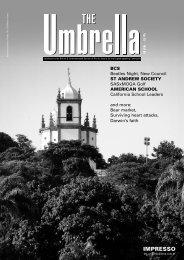Create successful ePaper yourself
Turn your PDF publications into a flip-book with our unique Google optimized e-Paper software.
14<br />
ELECTIONS GUIDE FOR DUMMIES<br />
MIKE ROYSTER<br />
By the time Halloween (31st October)<br />
turns into All Saints Day, Brazil will<br />
have elected a President, 54 Senators,<br />
513 federal Deputies, 27 state<br />
Governors and around 1059 state<br />
Deputies. By the end of All Souls Day<br />
(November 2), the USA will have<br />
elected 37 state Governors, 36 federal<br />
Senators, 435 federal<br />
Congresspersons, and 6,125 state<br />
legislators. The electoral processes in<br />
the two countries vary tremendously,<br />
and we will here attempt to explain the<br />
most significant differences.<br />
Let's start with the fact that in Brazil,<br />
voting is obligatory for all citizens<br />
between ages 18 and 70, whereas in<br />
the US and most other countries, it is<br />
entirely optional — a right, not a duty.<br />
Brazil has no absentee or mail-in<br />
ballots, nor early voting options, as are<br />
common in many parts of the USA.<br />
Voters who are out-of-town on Election<br />
Day must “justify” their inability to vote<br />
in the locale where they are registered,<br />
or be subject to a small fine. Brazilian<br />
citizens who live or are traveling<br />
abroad have the option to vote, as do<br />
US citizens abroad, but only at a<br />
Brazilian embassy or consulate, and<br />
only for President. In the first round of<br />
elections, 15% of Brazilian voters did<br />
not show up at the polls, another 10%<br />
voided their votes, so the number of<br />
votes counted was 75% of the possible;<br />
in the USA, the voter participation on<br />
3rd November probably did not<br />
exceed 55%, although varying from<br />
state to state.<br />
Term limits<br />
The Brazilian Constitution prohibits<br />
Presidents and Governors from<br />
serving more than two consecutive<br />
four-year terms. Under the US<br />
Palacio da Alvorada, Brasilia White House, Washington DC<br />
Constitution, Presidents cannot be<br />
elected for more than two four-year<br />
terms, and some states (but not all)<br />
have similar rules for Governors. The<br />
big difference between them is the<br />
word “consecutive”. Lula was elected<br />
twice, consecutively, so he could not<br />
stand for the 2010 election — but in<br />
2014 he will be free to run again, as is<br />
Fernando Henrique Cardoso. George<br />
Bush and Bill Clinton were elected<br />
twice, so they can never run for<br />
President again.<br />
We next consider second round, or<br />
run-off elections for Executive Branch<br />
positions. In Brazil, if no candidate for<br />
President or Governor or mayor of a<br />
state capital receives one-half plus one<br />
of the valid votes cast in the first round,<br />
there must be a run-off election<br />
between the two candidates who<br />
garnered the most votes in the first<br />
round. That is why Dilma Roussef, who<br />
won almost 47% of the valid votes, was<br />
squared off against José Serra on 31st<br />
October, and why Marina Silva, who<br />
got 19% of the votes for President, is<br />
not running this time. Sergio Cabral,<br />
who won 61% of the votes cast for<br />
Governor of <strong>Rio</strong> de Janeiro, did not<br />
have to face a second round; however,<br />
7 Brazilian states and the Federal<br />
District did have run-off elections for<br />
Governor. In municipal elections for<br />
mayor, all state capitals and cities with<br />
more than 200,000 registered voters<br />
must have run-off elections; all other<br />
towns use the first-past-the-post system.<br />
American Presidents are chosen by the<br />
sui generis Electoral College system,<br />
and there is never a run-off election.<br />
One result is that a few US Presidents<br />
have been elected even though they<br />
received fewer popular votes than<br />
their adversary. Very few US States<br />
require a run-off election for<br />
Governor, using rather the “first past<br />
the post” system, so that in most states<br />
the candidate with the most votes wins,<br />
even if he received only a minority<br />
share of the total popular vote cast.<br />
The above lead us to another<br />
prominent difference between the<br />
electoral systems. The US system is<br />
actually not a single “system” at all. The<br />
US Constitution grants states the right<br />
to manage elections. Each of the states<br />
determines its own system, and many<br />
states delegate to their counties. This<br />
means that there are literally hundreds<br />
of systems being used simultaneously<br />
on Election Day, with no single<br />
standard to regulate them.<br />
Accordingly, all 50 states would have to<br />
adopt a single standard for voting to<br />
approach the Brazilian system (see<br />
below). Disputes over US elections<br />
must be resolved, first, in state courts,<br />
with appeals then going to the federal<br />
Supreme Court in rare instances —<br />
most readers will remember George<br />
Bush in 2000.<br />
Brazil does it better<br />
Brazil, on the other hand, has a<br />
completely federalized system,<br />
centered on a subdivision of the<br />
judicial branch — the electoral<br />
tribunals, with separate levels of courts<br />
— regional (“TRE”) and superior<br />
(“TSE”). The National Congress<br />
enacts electoral statutes applicable<br />
throughout the country, but the TSE<br />
regulates them and enforces the rules.<br />
If a party or a candidate wishes to<br />
challenge something, it must go to the<br />
electoral court, not to the civil courts.<br />
Decisions by TSE can be appealed to<br />
the Federal Supreme Court (STF).<br />
Because the law determines a universal<br />
standard applied across the country,<br />
all voters from Chuí in <strong>Rio</strong> Grande do<br />
Sul to Oiapoque in Amapá, use the






